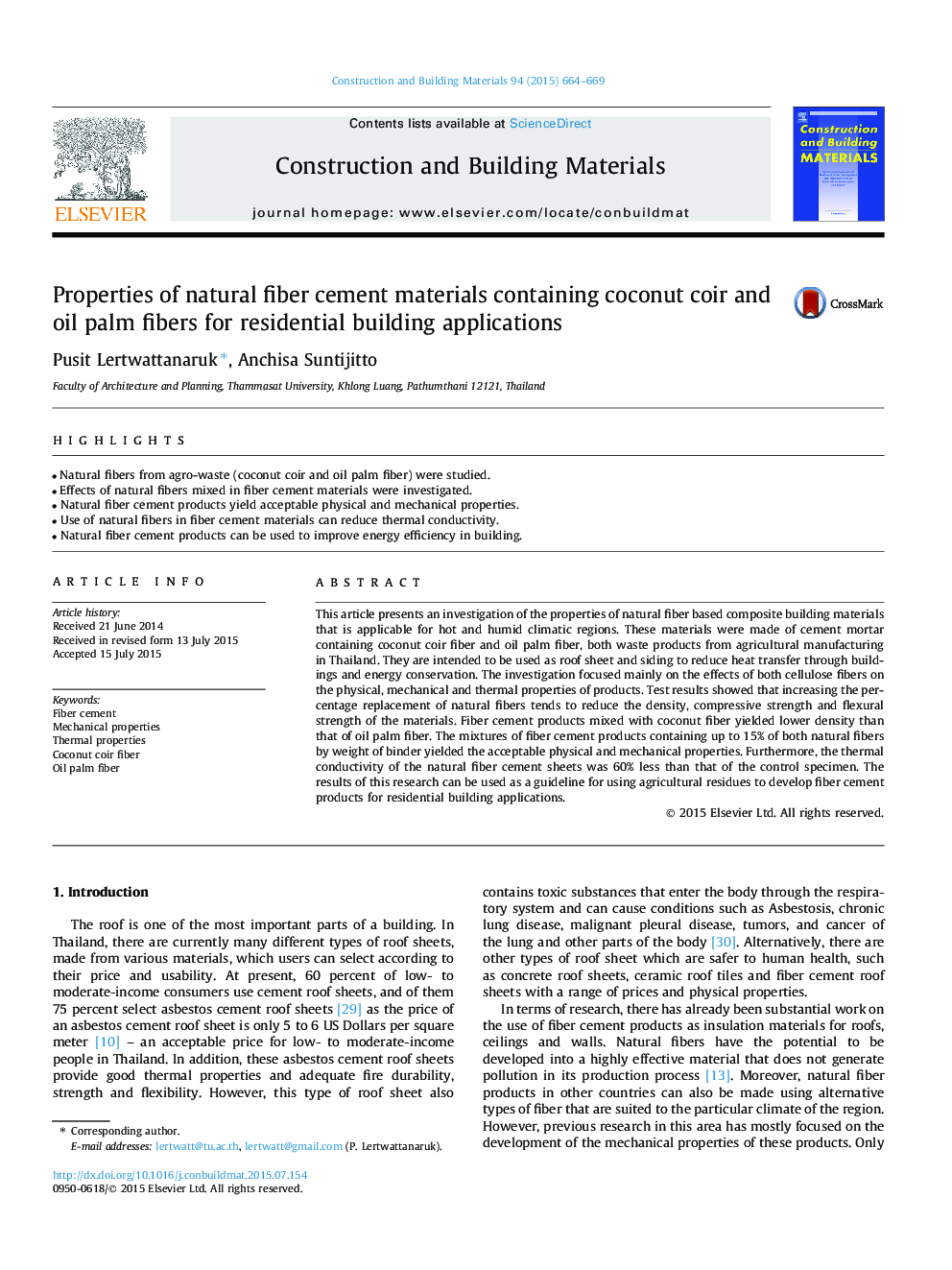| کد مقاله | کد نشریه | سال انتشار | مقاله انگلیسی | نسخه تمام متن |
|---|---|---|---|---|
| 6720738 | 503565 | 2015 | 6 صفحه PDF | دانلود رایگان |
عنوان انگلیسی مقاله ISI
Properties of natural fiber cement materials containing coconut coir and oil palm fibers for residential building applications
ترجمه فارسی عنوان
خواص فیبرهای سیمان فیبر طبیعی شامل الیاف نخل نخود فرنگی و نارگیل برای برنامه های کاربردی ساختمان مسکونی
دانلود مقاله + سفارش ترجمه
دانلود مقاله ISI انگلیسی
رایگان برای ایرانیان
کلمات کلیدی
سیمان فیبر، ویژگی های مکانیکی، خواص حرارتی، فیبر کوک نارگیل، فیبر نخل نخود،
ترجمه چکیده
در این مقاله، بررسی خواص مواد ساختمانی کامپوزیتی مبتنی بر الیاف طبیعی که برای مناطق گرم و مرطوب آب و هوایی قابل استفاده است. این مواد ساخته شده از ملات سیمان شامل فیبر کوک نارگیل و فیبر نخل نخود، هر دو مواد زائد تولید کشاورزی در تایلند. آنها در نظر گرفته می شود به عنوان ورق سقف و سایدینگ برای کاهش انتقال حرارت از طریق ساختمان ها و صرفه جویی در انرژی مورد استفاده قرار گیرد. تحقیقات بیشتر به اثرات هر دو الیاف سلولز بر خواص فیزیکی، مکانیکی و حرارتی محصولات پرداخت. نتایج آزمون نشان داد که افزایش درصد جایگزینی الیاف طبیعی باعث کاهش تراکم، مقاومت فشاری و مقاومت خمشی مواد می شود. محصولات سیمان فیبر، مخلوط با فیبر نارگیل، چگالی کمتری نسبت به فیبر نخاع نفت تولید می کنند. مخلوط محصولات سیمان فیبر حاوی 15٪ از هر دو الیاف طبیعی با وزن اتصال دهنده، خواص فیزیکی و مکانیکی قابل قبول را به دست آوردند. علاوه بر این، رسانایی حرارتی ورقه های سیمان فیبر طبیعی 60٪ کمتر از نمونه های شاهد بود. نتایج این تحقیق می تواند به عنوان یک راهنما برای استفاده از باقی مانده های کشاورزی برای توسعه محصولات سیمان فیبر برای برنامه های کاربردی برای ساختمان های مسکونی استفاده شود.
موضوعات مرتبط
مهندسی و علوم پایه
سایر رشته های مهندسی
مهندسی عمران و سازه
چکیده انگلیسی
This article presents an investigation of the properties of natural fiber based composite building materials that is applicable for hot and humid climatic regions. These materials were made of cement mortar containing coconut coir fiber and oil palm fiber, both waste products from agricultural manufacturing in Thailand. They are intended to be used as roof sheet and siding to reduce heat transfer through buildings and energy conservation. The investigation focused mainly on the effects of both cellulose fibers on the physical, mechanical and thermal properties of products. Test results showed that increasing the percentage replacement of natural fibers tends to reduce the density, compressive strength and flexural strength of the materials. Fiber cement products mixed with coconut fiber yielded lower density than that of oil palm fiber. The mixtures of fiber cement products containing up to 15% of both natural fibers by weight of binder yielded the acceptable physical and mechanical properties. Furthermore, the thermal conductivity of the natural fiber cement sheets was 60% less than that of the control specimen. The results of this research can be used as a guideline for using agricultural residues to develop fiber cement products for residential building applications.
ناشر
Database: Elsevier - ScienceDirect (ساینس دایرکت)
Journal: Construction and Building Materials - Volume 94, 30 September 2015, Pages 664-669
Journal: Construction and Building Materials - Volume 94, 30 September 2015, Pages 664-669
نویسندگان
Pusit Lertwattanaruk, Anchisa Suntijitto,
